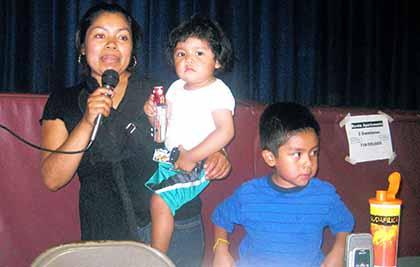By Rebecca Henely
Finding an apartment can be a hardship for many in Queens, but for those with children, it can be nearly impossible. Many families with children are turned away from apartments, and often the landlords do so in defiance of the law.
At a meeting last Thursday at Our Lady of Sorrows Church in Corona, the Queens Congregations United for Action invited Robert Tilley of the City Commission on Human Rights to talk to residents about how to fight this form of housing discrimination. The presentation was given mostly in Spanish, with interpreter Francisco Valencia translating for English speakers and translating Tilley’s words from English into Spanish.
“We’re not here to attack owners,” said Altagracia Perez of Our Lady of Sorrows Church. “We’re here to know our rights.”
Bernardo Villegas, a member of QCUA, said the organization did a study last year in which it called 94 different landlords advertising apartments. Of those contacted, 30 percent did not allow children.
“For residents of Corona, our children are not welcome in our community,” Villegas said.
He said common reasons landlords gave for not allowing children are kids make too much noise, children use too much water, youngsters destroy things, there are no security bars on the windows of the apartment or the apartment is new or has recently been renovated.
Villegas said no matter what the reason, it is illegal to deny someone housing because they have children. While rooms for rent and two-family homes where the owner lives in the home and does not advertise the apartment publicly are not subject to anti-discrimination law, apartments in buildings with three or more apartments, two-family homes that are publicly advertised anywhere and cooperatives and condominiums are covered under the law.
He encouraged those who were the victims of discrimination in housing — whether for having children or for another reason — to take down the details of the situation, then call 311 or visit QCUA or contact their City Council member.
He said the process is long. Complainants need all the information on both the landlord and the renter, they need to go to the city Human Rights office on Rector Street in person and the complaints can take from three months to a year to be resolved. But despite the large number of landlords who deny tenancy based on children, few renters complain.
“This is why we’re fighting against this discrimination against children,” Villegas said.
The QCUA then put on a skit about a mother trying to find housing and being denied multiple times because she had children. Then others shared their bad experiences being denied housing.
“I felt terrible,” said Maria Rodriquez, who was turned away from an apartment because she had three kids. “It makes me sad because our children can’t have a better home. Our children need a future. As parents, we give them what little we have, but what can do we do when landlords reject our kids?”
Tilley told the audience it is illegal to deny housing in private residences for reasons such as having kids, but also due to race, age and alien/citizenship status. He said landlords are allowed to check if tenants can afford the house, request proof of employment, request a credit check and deny residency for reasons of overcrowding — generally two people per bedroom.
“You’re the one who decides where you live,” Tilley said.
He said if residents file a complaint with the CCHR, the commission will launch an investigation. At best, the commission should be able to help residents get an apartment as well as payment of damages for emotional pain and suffering. But most complaints could be settled out of court.
He encouraged residents to get an expert to tell them their rights in landlord-tenant law and also to become activists, teaching themselves, neighbors, landlords and real estate agents about this issue.
“It’s your government,” Tilley said. “We’re accountable to you.”
Reach reporter Rebecca Henely by e-mail at rhenely@cnglocal.com or by phone at 718-260-4564.


































